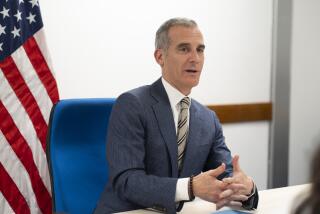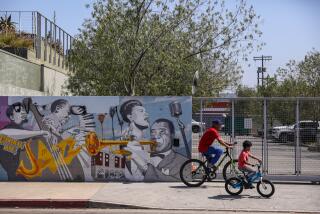Eric Garcetti invokes Latino-Jewish ancestry in mayor’s race
- Share via
Working a recent breakfast gathering of business owners in Northridge, Los Angeles mayoral contender Eric Garcetti introduced himself in Hindi when a Sikh businessman approached.
A few hours later, Garcetti donned a colorful Peruvian headpiece with ear flaps as he spoke Spanish with immigrants on the steps of City Hall, part of a show of solidarity for designating a stretch of Hollywood’s Vine Street as “Peru Village.”
After lunch, Garcetti joined rabbis at a City Hall menorah lighting. Wearing a yarmulke, the Hollywood-area councilman sang Hanukkah songs in Hebrew, English and Spanish. “Toda la familia,” Garcetti said as the group huddled for a photo.
A top contender to succeed Mayor Antonio Villaraigosa, Garcetti prides himself on his ease with the city’s diverse cultures. He sees his mixed ancestry (“I have an Italian last name, and I’m half Mexican and half Jewish,” he says) as a powerful part of his appeal in a city where voters for decades have split along racial and ethnic lines in mayoral elections.
But as the campaign begins to capture public attention, a big question is whether Garcetti can re-create the surge of Latino support that helped secure Villaraigosa’s historic election eight years ago as the first Latino mayor of modern Los Angeles.
Garcetti, whose district includes Silver Lake and Echo Park, is counting on strong support citywide from Latinos and liberals, buttressed by scattered support from other groups. Weaving a multiethnic tapestry of voters will be crucial to offsetting his opponents’ strengths, such as San Fernando Valley white voters who tend to turn out heavily in local elections and might favor City Controller Wendy Greuel, who previously represented the area on the City Council.
It’s no small challenge. Greuel and City Councilwoman Jan Perry of South Los Angeles each aspire to be the first woman elected mayor of Los Angeles, another historical marker that could spark — to Garcetti’s detriment — the kind of enthusiasm that carried Villaraigosa into office.
Also, some of the city’s most prominent Latino political leaders have shunned Garcetti’s candidacy in the March 5 mayoral primary, deciding to close ranks behind Greuel.
Villaraigosa has stayed neutral, but Greuel has won the backing of L.A. County Supervisor Gloria Molina, an iconic figure in Latino politics who broke barriers as the first Latina elected to the state Legislature, City Council and Board of Supervisors.
Also backing Greuel are Dolores Huerta, co-founder of United Farm Workers, and state Assembly Speaker John Pérez (D-Los Angeles).
When he announced his support for Greuel, Pérez, a cousin of Villaraigosa, appeared to challenge Garcetti’s bid to assume a leadership position among the city’s nearly 2 million Latinos.
“There isn’t a Latino candidate running for mayor that I know of,” he told KPCC public radio.
After Garcetti called Pérez to complain, the Assembly speaker apologized, saying he misunderstood Garcetti’s ethnic heritage.
Garcetti has Mexican roots through his father, former Dist. Atty. Gil Garcetti. Eric’s grandfather, Salvador Garcetti, was born in Mexico and grew up in Boyle Heights. Salvador was brought to the United States as a baby after his father, Massimo Garcetti, a judge who had emigrated from Italy, was hanged during the Mexican Revolution that began in 1910, Garcetti says. Eric’s grandmother, Juanita Iberri, one of 19 children in a family that migrated from Sonora, Mexico, was born in Arizona.
On his mother’s side, Garcetti is a descendant of Jewish immigrants from Russia, Poland and the Ukraine. They too settled in Boyle Heights in the early 20th century. Garcetti’s maternal grandfather, Harry Roth, turned the family’s Los Angeles clothing business, Louis Roth & Co., into a major national brand of high-end suits for men.
Eric Garcetti and seven relatives now oversee the Roth Family Foundation. On its website, it has reported giving $5.9 million in grants since 2000 to hundreds of organizations, among them the PUENTE Learning Center, Planned Parenthood LA and the Silverlake Conservatory of Music.
Garcetti, 41, was raised in Encino and attended a public elementary school at UCLA. From 7th to 12th grade, he went to Harvard, then a private boys’ school in Studio City. The family moved to Brentwood when he was a senior.
“Weekends involved bowls of menudo at my grandparents’ and bagels at my cousins’ house,” Garcetti said in an interview. “I think if you’re Latino, you’re very comfortable with the idea of mestizo, being mixed. So I kind of joke that I’m mestizo doble, double mixed.”
At Columbia University, Garcetti earned a bachelor’s degree in political science and a master’s in international affairs. He studied the Eritrean Revolution as a Rhodes Scholar at Oxford University and the London School of Economics, a stint that led to travels around the world.
“Having studied international relations, having taught it, having visited, I think, 80 countries in my life, having lived on a number of continents, in some ways prepared me to be mayor of this town, where over 200 languages are spoken, 140 countries are represented,” Garcetti said.
“I’ve lived in Thailand,” he added. “So I don’t have to spend my first 20 interactions with representatives of the Thai community getting to know them, finding out how they speak their language, or what they eat, or who they are. I’m already at Step 4: How are we going to get small-business loans for those restaurants in Thai Town that need it?”
Garcetti, a lieutenant in the Navy reserves, has served on the City Council for almost 12 years, including a six-year stretch as council president.
He takes credit for revitalizing Hollywood over the last decade, though the transformation has involved many players. He reminds audiences of the area’s troubled past with drug dealers, streetwalkers, “crime and grime and empty storefronts.” The turnaround, he told the Northridge business group, has been “nothing short of miraculous.”
To broaden his appeal, Garcetti plays up his vision for Los Angeles, saying that a clear narrative is needed for the city’s economy to thrive. “I see my first job as being storyteller in chief,” he said.
The city slogan should be: “Los Angeles is where creativity lives,” he said. He wants to see Disney characters greeting kids coming off planes at Los Angeles International Airport, bands playing at the baggage claim, Hollywood movies at U.S. customs counters and Korean taco trucks outside.
Like Greuel and lawyer Kevin James, the lone Republican in the race, Garcetti casts himself as a fiscal hawk, highlighting his support for cutting the cost of health and pension benefits for the city workforce. But Garcetti also backed labor’s push for what critics say were overly generous raises for city workers just before the 2008 economic crash.
James, for one, ridicules the prospect of Garcetti — or Greuel or Perry, for that matter — defying the will of unions or developers.
“The idea of Eric Garcetti standing up to any powerful interest is laughable,” James strategist John Weaver said.
But as much as anything, it is likely to be how Latino voters perceive Garcetti and his record that will determine his chances of reaching the mayor’s office. Latinos made up 25% of the vote in the 2005 election of Villaraigosa, up from just 10% in 1993, when Richard Riordan was elected mayor, exit polls show. The challenge for Garcetti will be winning over Latinos on a scale comparable to Villaraigosa, and getting them to the polls.
He’s trying. He switches to Spanish whenever the opportunity arises, sometimes one-upping rivals at candidate forums. “Our health is a human right,” he told a largely Latino group at a recent event in South L.A., adding for good measure: “Nuestra salud es un derecho humano.”
On a recent Saturday in Boyle Heights, mariachi trumpets and guitars greeted Garcetti at a fiesta thrown by Latinos for him at the Mi Pueblo banquet hall. Garcetti paid tribute to Mexicans, Guatemalans, Peruvians and others in the crowd. He told of his family’s arrival in Boyle Heights a century ago, and then again invoked ethnic food as a symbol of his mixed heritage.
“I don’t think we had a weekend growing up,” he told the crowd, “when I didn’t have pan dulce, menudo, and — because of my mother — bagels too.”
More to Read
Sign up for Essential California
The most important California stories and recommendations in your inbox every morning.
You may occasionally receive promotional content from the Los Angeles Times.














